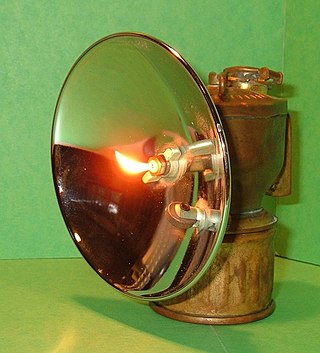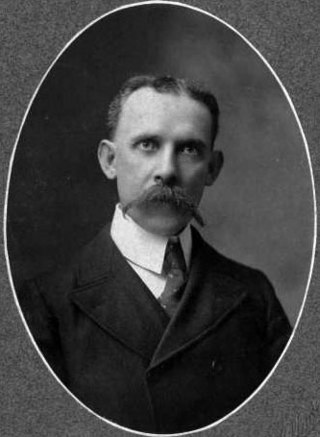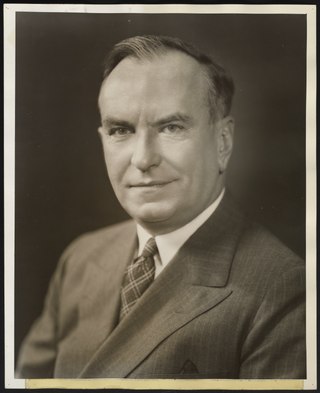
Calcium carbide, also known as calcium acetylide, is a chemical compound with the chemical formula of CaC2. Its main use industrially is in the production of acetylene and calcium cyanamide.

James VI and I was King of Scotland as James VI from 24 July 1567 and King of England and Ireland as James I from the union of the Scottish and English crowns on 24 March 1603 until his death in 1625. Although he wanted to bring about a closer union, the kingdoms of Scotland and England remained individual sovereign states, with their own parliaments, judiciaries, and laws, both ruled by James in personal union.

Ira Remsen was an American chemist who discovered the artificial sweetener saccharin along with Constantin Fahlberg. He was the second president of Johns Hopkins University.

John Motley Morehead was an American lawyer and politician who became the 29th governor of the U.S. state of North Carolina. He became known as "the Father of Modern North Carolina."
John Motley Morehead III was an American chemist, politician, and diplomat. As a chemist, his work provided much of the foundation for the business of Union Carbide Corporation. The Union Carbide and Carbon Corporation was formed in 1917 from the merger of the former Union Carbide founded in 1898 by Morehead's father; and the National Carbon Company founded in 1886. He was a noted philanthropist who made major gifts to his alma mater, the University of North Carolina at Chapel Hill. He also served as mayor of Rye, New York and United States Ambassador to Sweden.

John William Draper was an English-born American scientist, philosopher, physician, chemist, historian and photographer. He is credited with producing the first clear photograph of a female face (1839–40) and the first detailed photograph of the moon in 1840. He was also the first president of the American Chemical Society (1876–77) and a founder of the New York University School of Medicine.

Thomas Leopold "Carbide" Willson was a Canadian inventor.

Carbide lamps, or acetylene gas lamps, are simple lamps that produce and burn acetylene (C2H2) which is created by the reaction of calcium carbide (CaC2) with water (H2O).

Francis Preston Venable was a chemist, educator, and president of the University of North Carolina (UNC).
James Turner Morehead was the younger brother of North Carolina Governor John Motley Morehead and a Congressional Representative from North Carolina.

James Turner Morehead was a United States Senator and the 12th Governor of Kentucky. He was the first native-born Kentuckian to hold the governorship of the state. A member of Henry Clay's National Republican Party, Morehead entered politics just as his party was beginning to challenge the Democratic Party's dominance in the state.
James Morehead may refer to:

James II was King of England and King of Ireland, and King of Scotland as James VII from the death of his elder brother, Charles II, on 6 February 1685. He was deposed in the Glorious Revolution of 1688. He was the last Catholic monarch of England, Scotland and Ireland. His reign is now remembered primarily for conflicts over religious tolerance, but it also involved struggles over the principles of absolutism and the divine right of kings. His deposition ended a century of political and civil strife in England by confirming the primacy of the English Parliament over the Crown.

Charles Slaughter Morehead was a U.S. Representative from Kentucky, and served as the 20th Governor of Kentucky. Though a member of the Whig Party for most of his political service, he joined the Know Nothing, or American, Party in 1855, and was the only governor of Kentucky ever elected from that party.
Events from the year 1808 in the United Kingdom.
The Morehead-Cain Scholarship was the first merit scholarship program established in the United States. It was founded at the University of North Carolina at Chapel Hill in 1951 and was named for its benefactors, John Motley Morehead III and the Gordon and Mary Cain Foundation. The Morehead-Cain is among the most prestigious undergraduate educational opportunities worldwide, with only 3 percent of candidates gaining admission each year.

Dr. John Augustus Just was a German-born chemist and inventor. He is best known for his investigative work into recovery of precious metals from their ores and for completing the process for evaporating milk. For his scientific achievements, he was awarded a medal by the committee celebrating Berthelot's 50th anniversary.

Lily Connally Morehead Mebane was an American relief worker, politician, and heiress. During World War I, she chaired the Rockingham County Committee of the North Carolina Division of the Woman's Committee of the Council of National Defense. She worked in France and Romania with the American Committee for Devastated France, where she met Queen Marie of Romania. She remained friends with the Queen Marie until the queen's death in 1938. For her relief work during the war, Mebane was awarded the Cross of Mercy by King Peter I of Serbia and was made Knight of the Legion of Honour by the French government.

James A. Rafferty, Vice President, Officers' Committee member, Director, and member of the executive committee of Union Carbide, was an important figure in the petrochemical industry. Rafferty guided Union Carbide's effort in developing the new industry of synthetic aliphatic chemicals and was instrumental in the development of the liquid oxygen industry. Rafferty directed Union Carbide's collaboration with the United States government for the Manhattan Project and with the War Production Board for the synthetic rubber program during World War II.
Rufus Lenoir Patterson, Jr. was an American businessman who founded American Machine and Foundry and served as a vice president of the American Tobacco Company.














